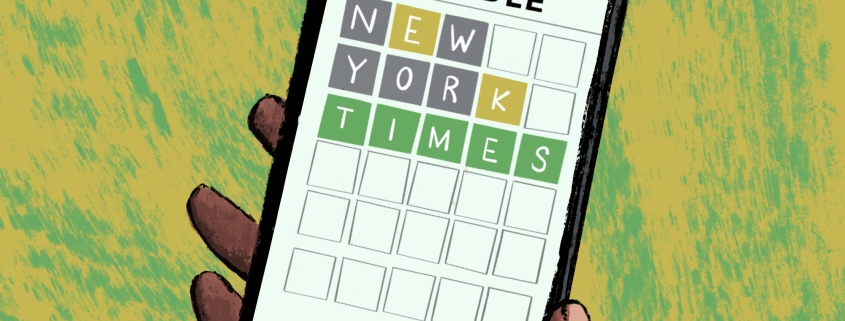Progress without Profit: Wordle and a profit-driven culture

In the midst of these unexpected, turbulent times, I can always be sure of one thing when I wake up: friends and family sending me their Wordle scores. Those yellow, green and gray squares have become a staple of my morning routine and are a fun way to start the day. I’m not alone in my obsession with the game — nationwide trends on Twitter prove the phenomenon has swept across the country.
The premise is simple: You have six tries to guess one new five-letter word. If a letter is in the word and in the correct spot, it turns green. If the letter is in the word but not in the correct spot, it turns yellow. If the letter is not in the word at all, it turns gray. Once you guess the word, you wait until the next day for a new one.
Software developer Josh Wardle originally created Wordle as a gift for his partner, not anticipating virality or a profit. Thus, Wordle is free to access, has no ads and can only be accessed on a website, rather than through an app. Further proving his altruistic motives, Wardle actually lost money on Wordle by spending $100 a month to maintain the website. In an interview with Time, Wardle said, “People ask me all the time about the monetization stuff … and I don’t know, maybe I’m an idiot. None of that really appeals to me.”
Despite Wardle’s initial goals, the game quickly became a global phenomenon. In the beginning of November, 90 people played Wordle. By the end of December, the number climbed to 300,000. In January, over 10 million people played.
In the face of smashing success, Wardle first stuck with his mission to keep the game free and without advertisements, much to my surprise. This past month, however, I received heartbroken texts from my fellow Wordlers (let’s make that name a thing) that Wardle had sold the game to the New York Times for an undisclosed sum in the low seven figures, leading players to assume the game would soon become a much different, and less fun, pay-to-play experience.
The journey of Wordle from a small, thoughtful gift to a seven-figure sale underscores the cultural urge to monetize. Wardle held off for longer than most, but eventually got overwhelmed by what he’d created. Taking a closer look at Wordle unveils what this desire for profit means nationwide and how that mindset could detrimentally affect nonprofits.
At first, when Wardle stuck to his guns and refused to turn Wordle into his piggy bank, others inevitably seized at the opportunity. Developer Zach Shakked made a copycat game called “Wordle — the app” which he put on the app store with an optional $30-per-year annual subscription that gave players an unlimited number of puzzles. Shakked bragged about the number of downloads and subscriptions he received, many of whom had likely made their purchase after confusing his copycat game for the original. However, after swift backlash, Apple removed the app from its store.
Public frustration with attempts to monetize the game is rooted in a growing frustration with the emphasis on entrepreneurialism. Why does everything have to become an opportunity to earn cash? When capital is celebrated as the most important resource in society, something purely for entertainment and fun appears meaningless.
A simple hobby always seems to become a way to earn a living in our profit-driven culture. If a person likes to work out, they’re pressured to make a YouTube channel about it and receive sponsors. If a person likes to knit, they should open an Etsy store to sell clothes. I am even guilty of asking my sister, who is a fantastic artist, when she will open a Redbubble store to sell her work. In a neoliberal society, the constant expectation is that we will market and commodify ourselves.
However, I can’t blame Wardle for eventually selling Wordle to the New York Times. If he hadn’t capitalized off his game, someone else would have. Additionally, New York Times promised to keep Wordle free “initially” but it’s only a matter of time before Wordle is no longer a form of connection and community but instead a marketing tool played by those willing to pay for it. I’m not upset at Wardle for taking the money, but more disheartened by the general attitude the transaction represents.
When people are always expected to create things that put more money in their pockets, nonprofits become a much less enticing industry. The purchase of Wordle illuminates a culture that revolves around capital, a culture that prioritizes high-paying jobs that are detrimental to society over lower-paying nonprofit jobs that make positive change. For the most success moving forward, we need to shift these narratives and resist the urge to monetize everything. Sometimes things should exist for the simple joy of them existing — without a scheme for profit attached.
Sophie Roppe is a senior writing about nonprofit organizations and social justice. Her column, “Progress Without Profit,” runs every other Monday.

